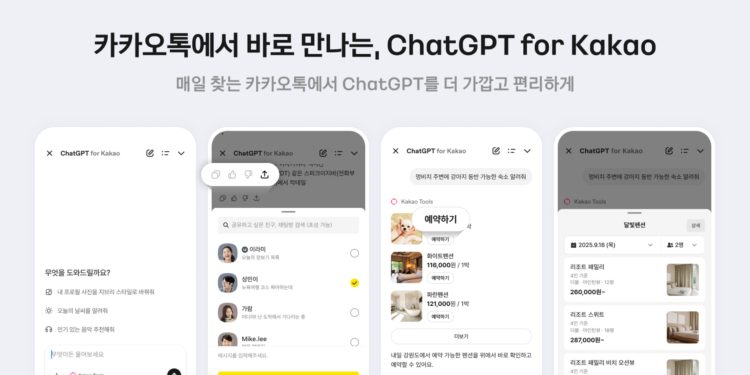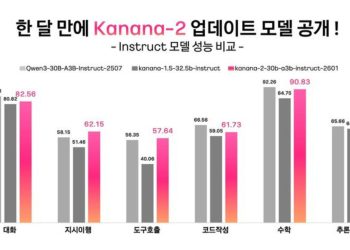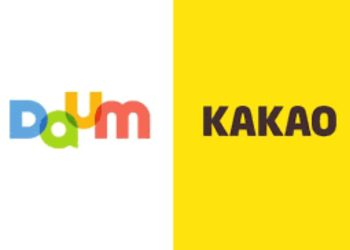The move marks a major milestone in Kakao’s partnership with OpenAI and its push to embed generative AI into daily digital communication.
Kakao has launched “ChatGPT for Kakao”, embedding OpenAI’s generative AI chatbot directly into KakaoTalk, South Korea’s most widely used messaging app. The rollout marks the first major milestone of Kakao’s partnership with OpenAI, announced earlier this year.
Users can now access ChatGPT with a single tap inside the KakaoTalk interface — no separate app required. The new ChatGPT icon, positioned at the top of the chat tab, allows users to ask questions, generate text or images, and share AI-generated responses in real time. Existing OpenAI account holders can sign in directly, while new users can register through Kakao accounts, with free usage limits and subscription options aligned with OpenAI’s own pricing model.
“The Key Advantage Is Accessibility”
Kakao emphasized that usability and simplicity were at the core of the design.
“The key advantage is accessibility,” said Yoo Yong-ha, AI Agent Platform Performance Lead at Kakao. “We designed this so users can interact with ChatGPT through KakaoTalk without the hassle of additional installations.”
The feature is currently available to mobile users aged 14 and above, with a desktop rollout planned for later. To celebrate the launch, Kakao is offering a one-month subscription payback for users who newly subscribe to ChatGPT Plus within KakaoTalk before the end of the year.
Kakao Tools: The New AI Assistant Ecosystem
A cornerstone of the integration is Kakao Tools, an AI agent platform powered by ChatGPT that connects KakaoTalk to other Kakao services. At launch, the system links with:
- Kakao Map – for instant location and navigation searches
- KakaoTalk Reservations – for booking restaurants or events
- KakaoTalk Gifts – for in-app gifting
- Melon – for music recommendations
For example, if a user types “Find a croffle café near Hapjeong Station”, ChatGPT for Kakao instantly opens Kakao Map to display results, while also suggesting follow-up actions like reserving a table or sharing a playlist via Melon.
Yoo noted that this marks a shift from simple Q&A-style AI interactions to task-oriented AI assistance:
“Users will experience a new AI agent environment where they can perform their desired tasks in one place without complex menu navigation or app switching.”
Balancing Innovation With Data Responsibility
While the new feature aims to make AI more practical, Kakao stressed its focus on user trust and privacy. Users can manage how their data is handled — including whether conversations are saved or used for AI model training — under Kakao’s and OpenAI’s privacy frameworks.
“User trust is at the core of our AI strategy,” the company stated.
The company’s data transparency features allow users to review and adjust permissions, reflecting a growing emphasis across the industry on responsible AI governance.
Building a Broader AI Ecosystem
Beyond messaging, Kakao plans to expand ChatGPT for Kakao beyond its own ecosystem. Future plans include:
- Extending ChatGPT access to non-Kakao apps through APIs
- Encouraging third-party developers to integrate services via Kakao Tools
- Partnering with the Ministry of Public Administration and Security on an AI National Secretary pilot that connects AI assistants to public services
This broader ecosystem approach suggests Kakao is not only embedding AI into chat but positioning itself as a platform for AI-driven services across sectors — from fintech to mobility and entertainment.
Kanana: Kakao’s Homegrown Conversational AI
In parallel, Kakao introduced “Kanana in KakaoTalk”, its proprietary conversational AI currently in beta testing. Powered by Kakao’s on-device model “Kanana Nano”, it interprets context and proactively engages users.
The beta version, launched on October 16, offers features like “Today’s Briefing”, which summarizes daily schedules, suggests relevant actions, and even sends reminder messages. Early results show 61% of invited users participated in the test, with 87% installing the on-device model.
“Kanana helps users with daily tasks — from suggesting nearby restaurants to reminding them about appointments,” said Kang Ji-hoon, Lead of AI Discovery Performance at Kakao.
The company plans to expand Kanana to Android in early 2026 and gradually integrate additional features such as calendars, birthdays, financial alerts, and telecom updates.
Restoring Simplicity and User Trust
Even as Kakao embraces AI, it remains attentive to user experience. The company confirmed plans to restore the original list-style layout of the KakaoTalk Friends tab by the end of the year, following widespread user backlash over a recent redesign. The feed-style update had been criticized for cluttering the app’s core messaging interface.
Kakao said the reversal underscores its “user-first” philosophy — balancing innovation with familiarity. This balance is likely to define how the company approaches AI integration: enhancing everyday convenience while maintaining the simplicity that made KakaoTalk ubiquitous.
Analysis: Kakao’s Strategic Bet on Everyday AI
Kakao’s latest moves position it at the forefront of AI integration within consumer communication platforms. While OpenAI’s ChatGPT dominates global headlines, Kakao’s localized implementation is significant for three reasons:
- Mainstream Accessibility: By embedding ChatGPT in a platform used daily by tens of millions of Koreans, Kakao makes AI interaction effortless and habitual.
- Platform Convergence: Through Kakao Tools, the company transforms messaging into a multitasking AI hub — bridging entertainment, shopping, maps, and scheduling.
- Dual-AI Strategy: With both ChatGPT integration and Kanana’s on-device model, Kakao is hedging between global AI scale and localized intelligence — an approach that could become a model for other Asian tech ecosystems.
If executed effectively, Kakao’s “AI-in-your-pocket” vision could redefine how Koreans — and potentially other Asian markets — use messaging platforms as gateways to AI-powered everyday services.







